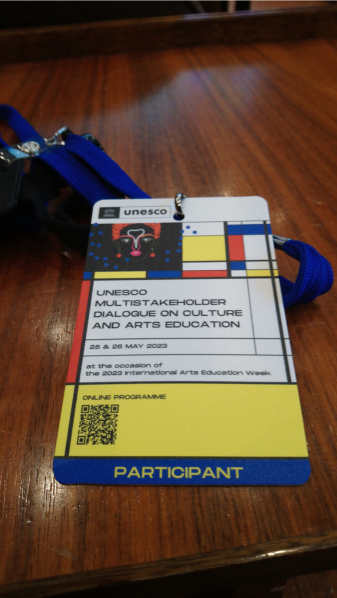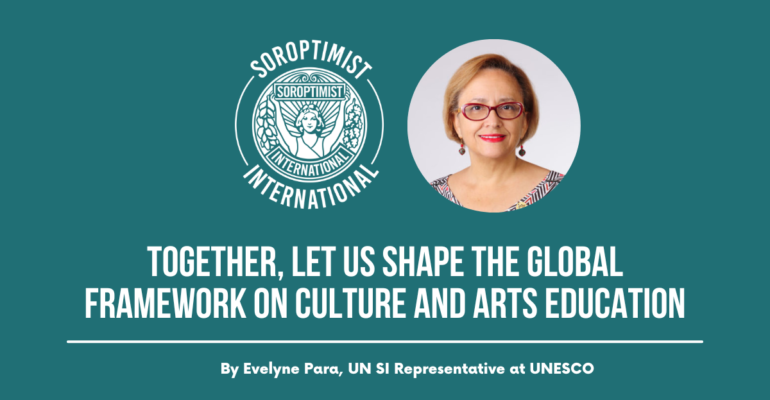Blog by Evelyne Para, UN SI Representative at UNESCO

This was the title of the invitation launched on 25 and 26 May 2023 by the two Sectors “Education” and “Culture” of UNESCO, with the support of the Republic of Korea, to recall that culture and education play together a crucial role in development of inclusive, peaceful, resilient and innovative societies. Culture and education are the cornerstone of sustainable development. Together they shape who we are and who we want to become.
I had the chance to participate in this very interesting event organised at UNESCO headquarters in Paris, and I am happy to give you an overview of the main topics discussed.
A privileged moment of multi stakeholder dialogue
On the occasion of this event, 400 participants from more than 45 countries and around thirty representatives of NGOs shared knowledge, perspectives and resources. It was a privileged moment of dialogue between peers and exchange of good practices between a diversity of actors from a wide range of expertise, including formal and non-formal education, cultural heritage, arts and creativity.

During these two days, UNESCO wished to recall that it is committed to renewing its vision of education anchored in respect for cultural diversity and human rights. In a world whose landscape is increasingly marked by dynamics of diversity, interdependence and fault lines, our approaches to quality education have evolved considerably. It is now essential to have a wide range of skills to understand, adapt and evolve in the face of growing social, economic and technological requirements. Creativity, innovation, critical thinking, resilience and empathy – this set of transversal skills is essential to meet the opportunities and challenges of today and tomorrow.
At a time when challenges related to climate, peace and the future of our societies are converging, our need to combine the power of culture and education is more necessary than ever. Therefore we need to encourage integrated approaches to culture across a diversity of contexts and pedagogies, in order to better equip learners of all ages with the knowledge, skills and behaviors needed to reach their full potential, to face challenges futures and forge more equitable and peaceful futures for all.
Priority objectives have been targeted
Numerous thematic sessions and parallel events allowed participants to discuss current initiatives and projects, but also experiences capable of developing approaches and synergies in cultural and artistic education.
The plenary sessions were introduced by Stefania Giannini, UNESCO Assistant Director for Education, and by Ernesto Ottone R., UNESCO Assistant Director-General for Culture.
A few priorities emerged:
>>Access and inclusion, in order to pave the way for plural, equitable and resilient societies. The objective being to better equip learners with the knowledge and skills necessary for social cohesion and conflict prevention through culture and expression of creativity, but also to meet the varied needs of learners from different backgrounds, ensuring that everyone has an equal chance of success, integrating local heritage, indigenous knowledge and linguistic diversity.
>>Creativity and creative economy, in order to develop relevant technical skills to blossom out. Creativity and innovation are not just trendy concepts. They are skills that are increasingly in demand in the labor market and are necessary to adapt to the constantly changing demands of our time. Skills development for the cultural and creative industries strengthens the professionalization of the sector while pushing boundaries of problem-solving, communication and learning. Education can release and nurse this essential human resource.
>>Resilience and well-being, in order to develop sustainable pathways for individual and societal well-being. Cultural and arts education fosters self-confidence, critical thinking and resilience, which are key factors in acquiring skills and abilities for inclusive sustainable development. At the same time, it lays the foundation for the social and emotional skills essential for the development of peaceful and prosperous societies.
>>Promote lifelong learning and non-formal education, in order to cultivate learning opportunities for all. Museums, cities, communities, cultural places, artists, heritage sites and tradition bearers are some of the actors that promote cultural and artistic education in schools and outside the school environment, including through professional learning.
>>Teachers and educators, in order to strengthen and improve their capacities, working conditions and resources. Investing in teacher training has become a priority. Educators are at the heart of the educational offer, and their role/function may vary according to contexts and communities. It is essential to analyze their needs to fill the gaps and meet the challenges they face.
>>Digital technologies and Artificial Intelligence (AI), in order to highlight the opportunities, the digital divide, the negative impacts and the prospects for evolution. Digital transformation is experiencing rapid growth, generating new forms of learning, creation and communication on all platforms, and transcending borders. The acceleration of AI has also led to a rethink of its impact on cultural and artistic education.
>>Partnerships, to develop cooperation for long-term growth potential, towards integrated approaches in and through cultural and arts education. Innovative partnerships with national and local governments, cultural and educational institutions, artists, tradition bearers and practitioners, civil society and the private sector broaden the scope of possibilities and can be the key to their success.
In conclusion
This multi-stakeholder dialogue organised at UNESCO on 25 and 26 May 2023 allowed a diversity of voices to be heard around the cross-cutting issues of cultural and artistic education. Building on the legacy of the Lisbon Roadmap (2006) and the Seoul Agenda (2010), it is a key step that was able to create momentum through broad mobilisation before the World Conference UNESCO Conference on Cultural and Arts Education to be held in Abu Dhabi in December 2023.
To know more
From January 2023 to February 2023, UNESCO organised a series of online regional consultations. The results of these regional expert meetings will feed into the strategic content of the framework and the preparations for the World Conference on Cultural and Arts Education 2023.

